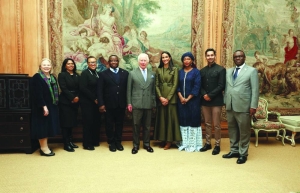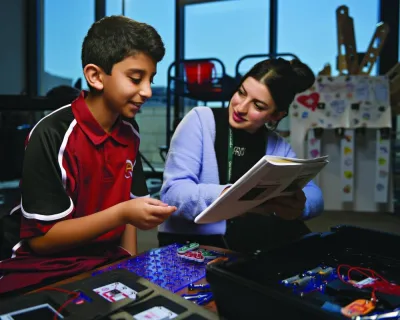The two-year collaboration, announced by QF Vice Chairman and Chief Executive Officer HE Sheikha Hind bint Hamad al-Thani and representatives of the King's Foundation at an event at the charity's headquarters, Dumfries House, Scotland, reflects both institutions' shared belief in the importance of traditional knowledge in promoting environmental sustainability, promoting local economic growth and building strong and resilient communities.
During a formal discussion at Dumfries House, the King's Foundation outlined its work in addressing urbanisation, climate change and biodiversity loss, followed by a discussion on sustainable development and the role of indigenous knowledge – a key element of the agreement between the QF and the King's Foundation .
After the discussion, King Charles III, founding royal president of the foundation, met with those present for a short reception.
Dignitaries present at the launch of the partnership included Sierra Leone President Julius Maada and First Lady Fatima Maada, Secretary-General of the Commonwealth Patricia Scotland, Tanzania's High Commissioner to the United Kingdom, Mbelwa Brighton Kairuki, Guyana's Minister for Local Government and Regional Affairs Development, Sonia Savitri Parag, and Manvendra Singh Shekhawat, founder of Dhun, India.
The four projects, selected to represent traditional sustainability practices in different regions, will demonstrate how cultural heritage can influence architectural design and construction in the face of contemporary challenges and influence sustainable urban planning.
Lessons learned from these projects in India, Guyana, Sierra Leone and Tanzania will be shared with countries facing similar challenges, including Qatar.
“Our partnership with The King's Foundation is based on a shared belief: that the timeless wisdom of traditional knowledge, shaped by generations in harmony with nature, is the key to building a sustainable future for our world,” said HE Sheikha Hind. “By protecting the cultural heritage of these four countries, we also preserve the invaluable knowledge and transform it into a living resource for sustainable development.”
“We look forward to bringing our work building sustainable communities and transforming lives to this new partnership,” said Kristina Murrin, executive director of the King's Foundation. “We have a long history of promoting traditional knowledge and skills to shape our future and the way we build our cities, which means we can hit the ground running on this range of new projects.”
In keeping with its role in leading sustainability-focused research and policy in Qatar and beyond, Earthna will work with the King's Foundation to develop the four pilot projects, provide research and policy expertise, and provide access to educational partnerships and capacity.
Each project will demonstrate how traditional building methods and materials can be used in modern environments; Educate target groups – including the local population, artisans, students and the local urban development community – about the importance of traditional knowledge for sustainable development; and to strengthen international understanding of the value of this knowledge for environmental sustainability, cultural heritage and economic development.
They will also create opportunities for economic, tourism and knowledge exchange between the projects' home countries and Qatar.
The focus of the project in Tanzania is on recognizing and restoring the famous Zanzibar Doors in the Unesco World Heritage Site Stone Town, as well as establishing sustainable timber supply chains.
In India, lessons are being learned and shared from Dhun, a development in Jaipur that transformed 500 hectares of denuded and degraded land into a thriving ecosystem.
In Guyana, the partnership will support a project to research and develop a demonstration building near restored mangroves on the waterfront of the city of Georgetown, using traditional design principles and local materials.
The Sierra Leone-based project will test sustainable construction that draws on traditional knowledge while protecting natural landscapes in the city of Bo, contributing to urban planning in this rapidly growing city.
Based on the findings and findings from all four projects, research publications will be compiled to document best practices and policy recommendations for countries around the world.
The projects are intended to serve as a template for how traditional knowledge of sustainable urban development creates stronger and more resilient communities through the use of local materials that are in harmony with natural ecosystems, while creating economic opportunities through products, education and ecotourism.
These four projects will be presented at the upcoming second edition of the Earthna Summit, taking place on April 22-23 in Doha.


